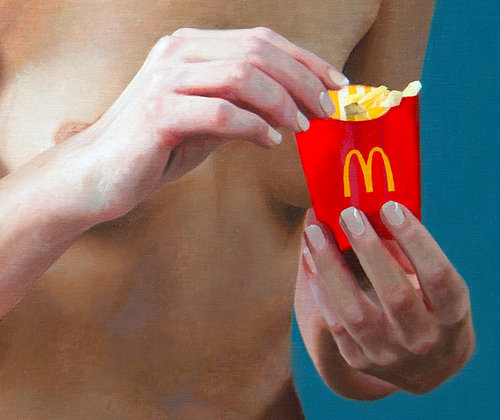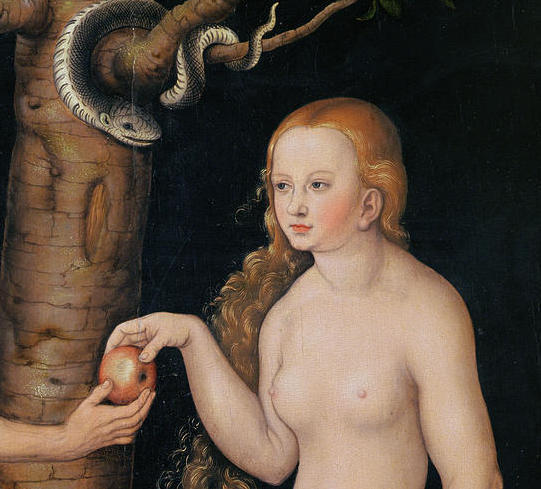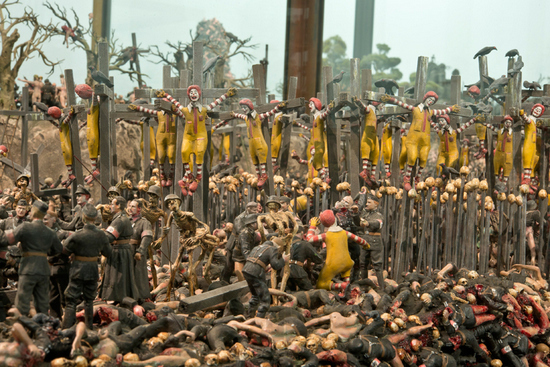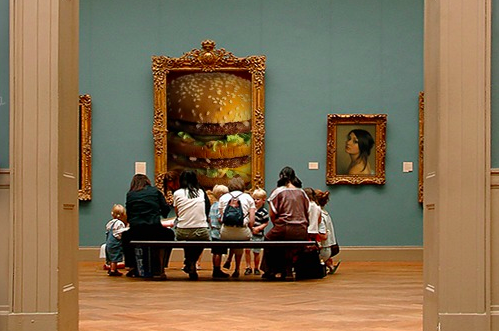An Alluring Woman With Fries and McDonaldization in Art
Posted: 12/27/2013 10:35 am

When I first glanced at Nadine Robbins' painting Mrs. McDonald a quote from the anthropologist Margaret Mead popped into my head:
Always remember that you are absolutely unique. Just like everyone else.
The canvas locked me into a Lacanian gaze with a naked woman -- a rust-haired model named Kaitlin -- who the artist has portrayed in a way that highlights her sultry mood and unique beauty. Then again Kaitlin isn't entirely shown as unique: she likes some McDonald's fries now and then, so she can't be all that different from the rest of us can she?
Those thin yellow pillars of starch, fried golden, sprinkled with a revelatory tang of salt and presented in an apple-red carton are a contemporary image of temptation that transcends all boundaries of gender, culture and belief. The image of Kaitlin's finger reaching for a fry has a teasing sensuality that would make even the most ascetic nutritionist salivate.

Mrs. McDonald naturally invites comparisons to an earlier narrative involving food and female nudity: In Medieval and Renaissance paintings innumerable Eves tempt Adam with appealing apples. As the shopworn myth goes, after one bite of that piece of fruit Adam and Eve find themselves expelled from the Garden of Eden into the wider world where they become aware of good and evil, of maleness and femaleness and of all opposites. They will go on to raise a family, and their sons will invent fratricide, war and tribalism when Cain murders Abel.
We call what follows civilization and culture. In other words, it is a very powerful and central myth. I think that one of the things the Eve story tells us is that if you control the food you control the culture. Would it be fair to say that in the 21st century the corporation is the snake?

Veering back towards contemporaneity, Mrs. McDonald strikes me as a self-consciously powerful woman who makes her viewers complicit: she is keeping her fries to herself knowing that we are judging her for indulging in a guilty pleasure. "You have caught me," her raised eyebrow seems to say, "but you are just like me because you love them too, even though you know they are bad for you." Mrs. McDonald is an Eve for our contemporary situation, one in which we insist on our individuality and difference while both craving and fearing commonality. We know that we can't go back to the garden of innocence, but our shared cravings -- which corporations apparently understand better than any individual -- can at least remind us of the human urges that bind us across nations and faiths.
A survey conducted by Sponsorship International discovered that far more of the people it surveyed worldwide could recognize that McDonald's golden arches (88 percent of respondents) than could recognize the Christian cross (54% of respondents). The word logo is derived from logos which originally meant "the word of God" and apparently the religion of capitalism -- a polytheistic faith with hundreds of prominent Gods/Corporations -- does a better job of knowing how to connect humanity than any faith or political party or leader. French fries are now the most popular vegetable in America, a favored food of Republicans and Democrats, gays and straights, Christians and Muslims: if they didn't make us fat we could think of them as a positive social force, right?
Then again those of us who like our culture highbrow regularly express our fears over the McDonaldization of culture; a process in which an emphasis on efficiency leads to predictable, controllable outcomes. The sociologist George Ritzer is credited with inventing the term and theorizing that McDonaldization is an extreme form of "rationalizing" in which logically consistent rules are substituted for traditional, illogical ones. As many of the world's current economic and social problems make painfully clear, The quest for efficiency works against individuality and spawns de-humanization, a dynamic that has increasingly plagued civilization and culture since the Industrial Revolution.
Visual Artists have been split on how to adapt to modernity's embrace of efficiency at the expense of craft and variety. Marcel Duchamp celebrated factory-made (readymade) objects as "art" and Andy Warhol, an extreme pragmatist and canny social observer, adopted mass production and mass imagery as the keystones of his art. Beginning with the Arts and Crafts movement, other innumerable artists -- those who continued to assert their individuality and channel their ideas through their limbs -- have resisted McDonaldization while running the risk of being called conservative because their artistic habits are the same as those of Medieval monks not artist/CEOs who let other's multiply their products and ideas for them. By choosing to paint representationally in a style that demands mastery of traditional skills Nadine Robbins is one of the former.
The contemporary artists that I most admire are distinctive individuals whose commitment to individual expression seems to defy and deflect predictability and McDonaldization. I like artists who are inefficient and whose motivations are human, fallible, and even unpredictable to the point of being quixotic. Like so many of my liberal, educated friends I fear corporations and corporate products since I worry that their ability to create commodities that I might actually crave collectivizes my acquisitive and therefore evil impulses. My fears are of course hypocritical as my entire lifestyle is an ocean of corporate products. Liking art allows me to point to one tiny island of culture and say "Look, individualistic and hand-made objects are still being made: Hallefreakinlujah!"
In searching the internet to find other contemporary works of art that involve McDonald's and/or McDonaldization I found myself very entertained by this vignette of a mass crucifixion of Ronald McDonalds from the vast diorama The Sum of All Evil created by Jake and Dinos Chapman.

I don't know that this scene has any precise meaning, but it struck me as suggesting a kind of revenge fantasy that the artists had concocted as an imaginative antidote to fast-food cultural totalitarianism. It might also be said that the Chapman diorama falls in line something sociologists have predicted in regards to McDonaldization: it predicts an unintended extreme that is the end-point of a over-rationalized culture taken to extremes. As the website www.mcdonaldization.com explains:
It turns out that over-rationalizing a process in this manner has an unexpected side effect. It's called irrationality. In a sociological context that simply means that a rationalized system may result in events or outcomes that were neither anticipated or desired, and in fact, may not be so good.
Jake and Dinos Chapman are moralists who have taken advantage of artistic free speech to make a point that is hyperbolic. Their thinking is imaginative breathtaking but also sensationalistic. I don't have as much angst -- or as many fears -- about the potential horrors of extreme McDonaldized culture as they apparently do. The fact that they can make and display their work in a major museum (The Tate) actually contradicts what they appear to be saying.
Maybe the reason that I was so struck by the painting Mrs. McDonald is that it transmits the idea that it suggests an individual can manage or even take control of the considerable power of corporate products corporatized culture. The current Renaissance of representational art and artists strikes me as being well-positioned to counterbalance and comment on the cultural influence of McDonaldization. Humanist values in art and culture have always been the powerful weapons against the excessive influence of powerful organizations.
If our culture can value, recognize and support the work of artists who can reflect both our individuality and our collective needs in meaningful works of art we can all enjoy and indulge in a Happy Meal now and then without fear. I understand that there is now a McDonald's at the Louvre and the museum is doing just fine.

